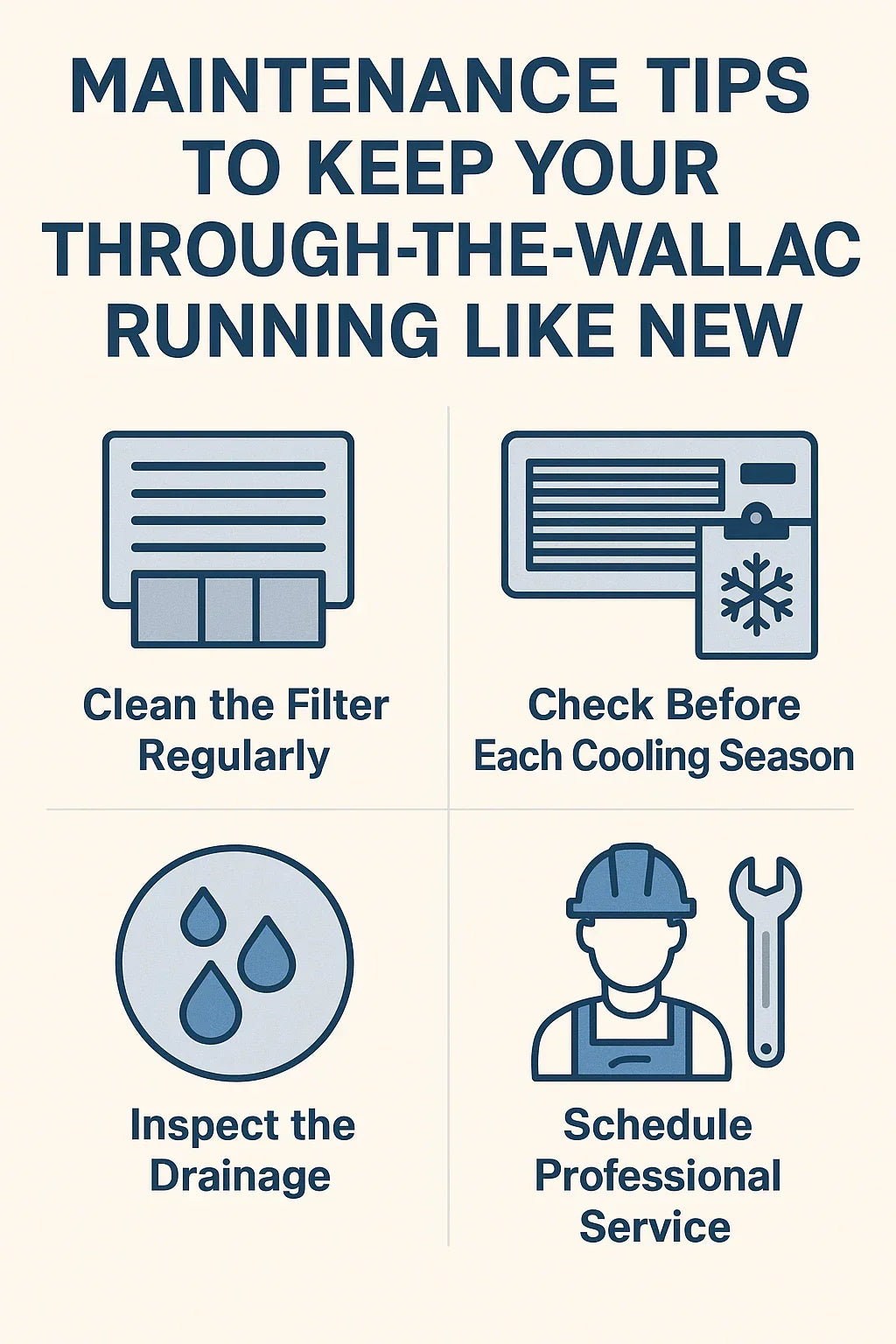Your through-the-wall AC (like the Amana PBH073J35AA) can deliver years of quiet, efficient cooling if you maintain it properly. Mike Sanders shares a practical, homeowner-friendly maintenance guide to help you extend your AC's lifespan, reduce energy costs, and maintain clean, comfortable air.
🧹 Why Maintenance Matters
✅ Extends the lifespan of your unit ✅ Reduces energy consumption ✅ Prevents mold, mildew, and odors ✅ Maintains optimal airflow ✅ Reduces noise from clogged filters or debris
Further reading:
🗓️ How Often Should You Service Your AC?
-
Monthly: Check and clean the filter during heavy use.
-
Seasonally: Inspect the unit before summer and before switching to heat (if using a heat pump model).
-
Annually: Deep clean the coils and inspect seals and drainage.
🪣 Cleaning or Replacing the Filter
The filter captures dust and debris that can clog your system.
✅ Remove and inspect the filter monthly.
✅ Wash with mild soap and warm water if reusable.
✅ Let it fully dry before reinserting.
✅ Replace disposable filters according to the manufacturer’s guidance.
A clean filter improves air quality and keeps your AC running efficiently.
🌀 Cleaning the Coils
Dust and debris on the evaporator and condenser coils reduce heat transfer, forcing your unit to work harder.
✅ Unplug the unit before cleaning.
✅ Remove the front panel to access the coils.
✅ Use a soft brush or vacuum with a brush attachment.
✅ For heavy buildup, use a commercial coil cleaner following instructions.
Tip: Clean coils at least once a year, more often in dusty environments.
Further reading:
💧 Checking and Cleaning the Drainage System
Condensation needs to drain properly to prevent leaks and water damage.
✅ Check the drain pan for standing water.
✅ Ensure the drain hole is clear.
✅ Use a small brush or compressed air to clear clogs.
🔍 Inspecting Seals and Gaskets
Through-the-wall units rely on seals to prevent warm air leaks and moisture infiltration.
✅ Inspect seals around the sleeve and AC annually.
✅ Reseal with weatherproof caulk if gaps are found.
✅ Check for air leaks on a windy day by feeling around the unit.
⚡ Electrical Safety Checks
✅ Ensure the unit’s dedicated circuit is functioning properly.
✅ Check the power cord for wear and replace if damaged.
✅ If your unit is not turning on or is tripping breakers, call a licensed HVAC technician.
🔇 Keeping Noise Levels Low
Noise can increase when:
-
Filters are clogged.
-
Coils are dirty.
-
The unit is loose in its sleeve.
✅ Regular maintenance keeps noise levels at manufacturer specifications.
✅ Check that the unit is level and the sleeve is secure.
🌡️ Off-Season Maintenance
When not in use:
✅ Clean the filter and coils.
✅ Cover the exterior to protect from debris, snow, or rain.
✅ Unplug the unit if not needed during winter.
Tip: Use a breathable cover to prevent moisture buildup while blocking dust and pests.
🧰 When to Call a Professional
✅ Refrigerant leaks (low cooling performance)
✅ Electrical issues
✅ Unusual noises after maintenance
✅ Water leaks you cannot identify
✅ Annual deep cleaning if you prefer professional care
Further reading:
🪟 Benefits of Regular Maintenance
✅ Lower energy bills
✅ Extended unit lifespan
✅ Better air quality
✅ Quieter operation
✅ Fewer repairs
✅ Reliable heating and cooling performance
✅ Conclusion: Protect Your Investment
Through-the-wall AC units like the Amana PBH073J35AA are built for durability, but regular maintenance ensures you maximize your investment while maintaining comfort.
Following these simple maintenance routines will keep your AC efficient, quiet, and ready for the seasons ahead.
In the next topic we will know more about: What’s the Difference Between Through-the-Wall and Window Air Conditioners?







